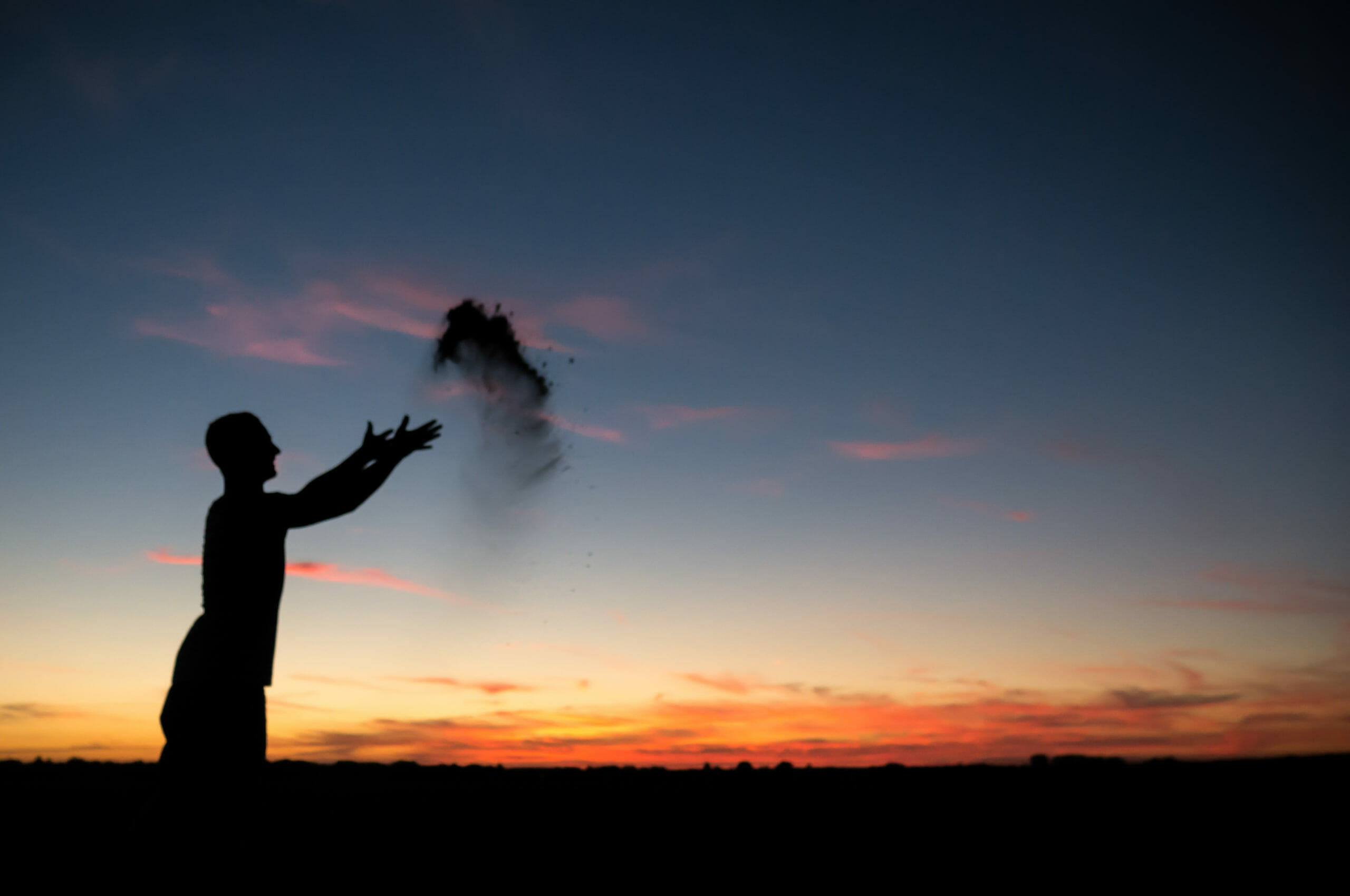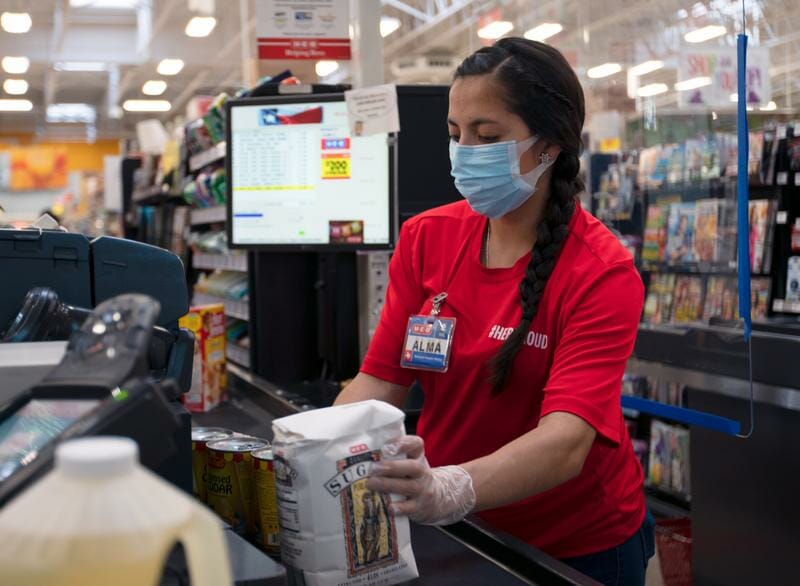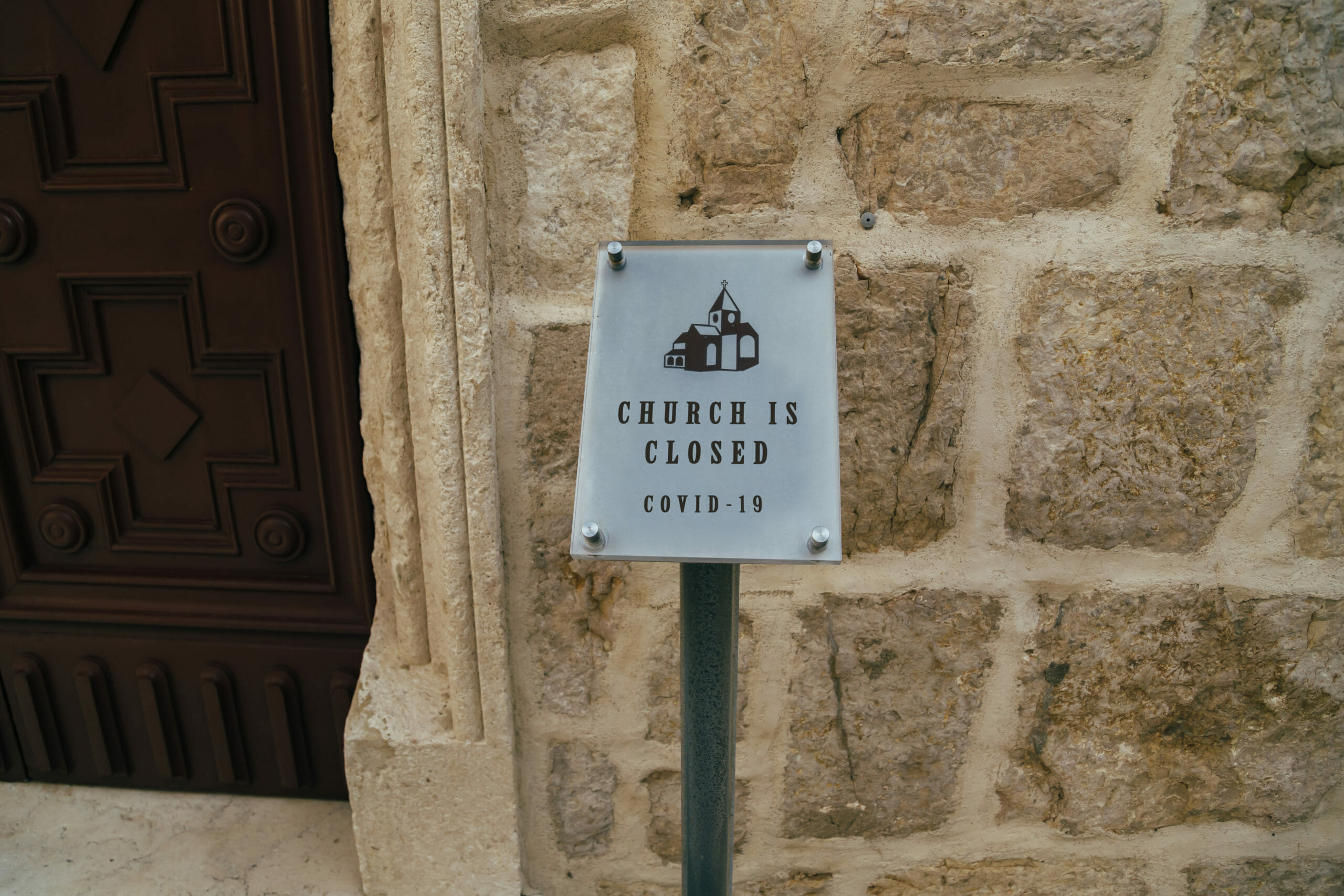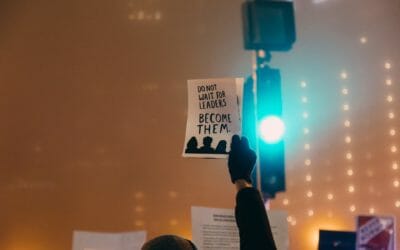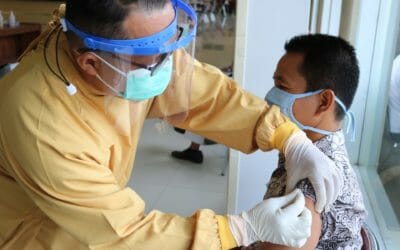From our writers
One year and counting—Christian Citizen reflections on the coronavirus pandemic
The Year in Review
On March 4, 2020 we published the first of many articles in response to the coronavirus pandemic. Today, we mark the occasion with this series of excerpts from articles published over the past year. They are a reminder of trials and tribulations experienced and challenges that remain. As with all that we publish, we hope these excerpts will inspire, encourage, and challenge our readers to bring a greater measure of justice, mercy, and faith into our communities and world.
Rev. Dr. A. Roy Medley
The coronavirus pandemic has shut down so many of the markers by which we navigate our lives—the routine of daily work and Sunday worship; a stock market that moves ever upward; hopping in our cars or on a train, ship or plane to go wherever we choose; outings to our favorite restaurants; hitting the stadium, ballpark or arena for a game; high school proms and college graduation ceremonies; family gatherings or hanging with friends; even our confidence in modern medicine to quickly offer a wonder drug or vaccine to subdue this pestilence. All these have been taken from us. Not since the AIDS epidemic has a silent, secretive killer threatened us like this and disrupted our sense of safety and invulnerability.
“The Lord is the stronghold of my life”—a meditation on Psalm 27 amid the COVID-19 pandemic
March 27, 2020
Even as we shelter in place, I work my garden and flower beds, sowing seeds as an act of hope and faith.
– Rev. Dr. A. Roy Medley
Rev. Dr. Greg Johnson
The disruption that has happened due to COVID-19 is devastating. It has changed and challenged lives. In this disruption, when the loss that has happened is named, it has the potential of revealing the resilience that resides within. While grief is painful, it is also restorative. It is important to take time to recognize things that have changed due to a loss. The human spirit is naturally resilient. Grief allows the soul to breathe anew. In moments of suffering, agony, and the pain of loss, practicing self-care and kindness is essential. Support networks that are affirming can be helpful during these times. Grief is not an attempt to fix what is broken. It allows the soul to breathe, inhaling a new reality while exhaling the pain of loss. This rhythm is the restorative aspect of grief as we walk through the stages that include shock and denial, anger, bargaining, depression, and acceptance. The gift is found in the journey.
The gift within the grim reality of grief
June 10, 2020
Photo by K. Mitch Hodge on Unsplash
There is power and a gift in grieving. When we are allowed to grieve, and when those relationships we are connected to are recognized, the process of healing is made available.
– Rev. Dr. Greg Johnson
Rev. Dr. Corey Fields
The collective and public anger, denial, and depression we are experiencing is normal and valid, but some of its expressions have been unhealthy. This is where the church is desperately needed. The public needs us to shepherd our communities through this grief, which involves both recognizing what it is as well as teaching and modeling healthy expression. We are more used to doing this on a smaller scale and in more private settings, but it is time for a wider view. Our society is fractured to a critical degree, and the church must do more than simply join in the chorus of loud voices on one side or the other of a divide. Jesus called himself the good shepherd and said that his sheep know and come to his voice. What would it look like for the church to be a part of a ministry of “naming and claiming” our collective fears and grief in such a way that people turn and say, “I know that voice. I hear my own grief”?
Public lament and grief shepherding: Neglected roles of the church in these times
June 10, 2020
We as a society are dealing with a lot of grief and loss right now. Woe to us, the church, if we don’t recognize and live into our crucial and unique role in this situation. In particular, I see two important but largely neglected roles for the church: public lament and grief shepherding.
– Rev. Dr. Corey Fields
Rev. Jerrod Hugenot
Frankly, by now, pastors are beat. Just like their congregants, they have dealt with many challenges. They too have kids and youth at home, now in their second semester of “virtual” or “hybrid” learning underway in many states. Many pastors worry about present and future employment issues. Community needs are increased, with food pantries being accessed by greater numbers of people. The challenges of the pandemic, and the political and social issues driving and dividing our country, make for a volatile context for pastors serving in churches everywhere.
Celebrating may seem an odd practice in times where there is much to lament and navigate. I am hopeful congregants will consider offering a word of thanks to their pastors this month. Gratitude and acknowledgment for ministry may be infrequently expressed, but certainly, for your pastor, it will be gratefully received—especially right now.
Pastoral appreciation in COVID-19 times
October 6, 2020
Celebrating may seem an odd practice in times where there is much to lament and navigate. I am hopeful congregants will consider offering a word of thanks to their pastors this month. Gratitude and acknowledgment for ministry may be infrequently expressed, but certainly, for your pastor, it will be gratefully received—especially right now.
– Rev. Jerrod Hugenot
Rev. Dr. Mae Elise Cannon
How many times have we heard it said over and over on the news, in social media, and other venues: “COVID-19 does not discriminate”? This statement is true, medically speaking – a virus does not discriminate based on race or socioeconomic status. However, the effects of the 2019 coronavirus do discriminate in terms of the resources, access to healthcare, and other critical realities that determine which populations will be the most affected by the virus.
The very same systems and power structures that embody racism and oppress the most vulnerable among us under normal circumstances make the experience of living during this global pandemic decidedly unequal.
COVID-19 does discriminate: The disproportionate impact of the virus on the poor and vulnerable
May 11, 2020
Photo courtesy of H-E-B Newsroom.
The very same systems and power structures that embody racism and oppress the most vulnerable among us under normal circumstances make the experience of living during this global pandemic decidedly unequal.
– Rev. Dr. Mae Elise Cannon
Dr. Marvin McMickle
Here is the challenge that confronts this country. After the coronavirus has come and gone, the underlying social and economic issues will remain. African Americans will continue to face disproportionate levels of poverty, sickness, and early onsets of diseases that can cripple our bodies and shorten our lives.
April 28, 2020
After the coronavirus has come and gone, the underlying social and economic issues will remain. African Americans will continue to face disproportionate levels of poverty, sickness, and early onsets of diseases that can cripple our bodies and shorten our lives.
– Dr. Marvin McMickle
Rev. Daniel Headrick
Remember that you are dust, and to dust you shall return. How quickly we have forgotten these words from Ash Wednesday. Our mortality is assured, but so too is our resurrection. So, we will live with the sure hope that Easter will redeem all plagues. To practice resurrection means that even though we occasionally despair, we are always looking for hope through the grace and mercy of God.
5 practices to live by in this uncertain, wilderness time
March 14, 2020
Photo by Benjamin Davies on Unsplash
Our mortality is assured, but so too is our resurrection. So, we will live with the sure hope that Easter will redeem all plagues. To practice resurrection means that even though we occasionally despair, we are always looking for hope through the grace and mercy of God.
– Rev. Daniel Headrick
Curtis Ramsey-Lucas
This Easter many Christians, perhaps most, will gather as the earliest Christians did—in homes. Unlike those early Christians, they will do so as individual families connected, if at all, through online platforms and streaming services. Like those who preceded them in the faith, they will break bread and praise God as the church has done through the ages—amid war, peace, famine, plenty, pandemic, plague, freedom, oppression.
Easter is not cancelled or postponed. It does not need to be repeated later. Every Sunday, Christians celebrate the resurrection in a Good Friday world. Perhaps this Easter this reality will be more evident than before.
Celebrating Easter in a Good Friday world
March 31, 2020
Churches shuttered. Services online. Bible study and prayer meetings via Zoom and other online platforms. This Easter, many Christians will gather as the earliest Christians did—in homes.
– Curtis Ramsey-Lucas
Rev. Dr. Debora Jackson
Filing for Chapter 11 protection does not necessarily mean permanent closure. Chapter 11, the reorganization chapter of the United States Bankruptcy Code, is a court-approved protected status for businesses that are unable to pay their creditors. This designation provides businesses with the opportunity to reorganize so they might emerge from protection with greater health and sustainability. While I am not suggesting bankruptcy protection for churches, it does stand to reason that many may need to consider reorganization during COVID-19 enforced closures. Like traditional retailers whose weaknesses were exploited by the pandemic, churches suffering from the impacts of decline have similarly been placed in precarious positions. So, if we might consider this time as an opportunity for reorganization, what would such changes look like?
June 9, 2020
Like traditional retailers whose weaknesses were exploited by the pandemic, churches suffering from the impacts of decline have similarly been placed in precarious positions. So, if we might consider this time as an opportunity for reorganization, what would such changes look like?
– Rev. Dr. Debora Jackson
Laura Alden
It is not a new idea to consider Advent, Christmas and the new year as an annual “reset,” a chance to begin again to repair the broken pieces of our lives. But it may be time to rethink how we are to make our way forward in such a time as this – clear-eyed and determined, wielding glazing kits, sewing kits, whatever tools we can muster. We are people of hope, after all. And no matter the rancor and outrage and sorrow and fear of this year, a light is coming.
December 2, 2020
The Christian Citizen
Follow Our Continuing Coverage
Take a sabbatical from catastrophizing
Catastrophizing may be a new word, but it is not a new phenomenon. What we need is a sabbatical, a rest from worrying about our catastrophes and fixating on what we conjure up as the worst possible outcomes.
COVID-19 era leadership
The church has been significantly affected by the lingering impacts of COVID-19. The COVID era and its related impacts are here to stay. We would do well as pastors to understand how we can be most effective as we lead.
Rights, public safety and common sense
While we live in a democracy where we are entitled to exercise our “unalienable rights,” public safety has not registered on the hearts, minds, and souls of some Americans. While our rights are indeed important, we need to be alive and healthy to fight for these rights. May we find it in our collective hearts to truly be our brother’s keeper in our efforts to keep one another safe. May we look beyond the narrow view of “rights” to see the broad perspective of public safety.



